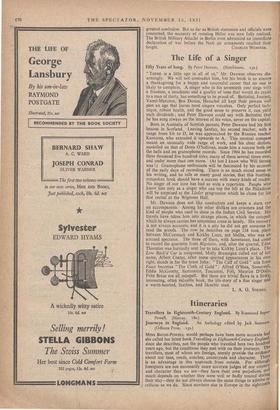The Life of a Singer
Fifty Years of Song. By Peter Dawson. (Hutchinson. i ss.) "THERE is a little ego in all of us," Mr. Dawson observes dis- armingly. We will not contradict him, but his book is so sincere a thanksgiving for 'a happy and successful career that no one is likely to complain. A singer who in his seventieth year sings with a freedom, a steadiness and a quality of tone that would do credit to a man of thirty, has something to be proud of. Battistini, Journet, Vanni-Marcoux, Ben Davies, Henschel all kept their powers welt past an age that leaves most singers voiceless. Only perfect tech- nique, robust health, and the good sense to preserve it, can yield such dividends ; and Peter Dawson could say with Battistini that he has sung always on the interest of his voice, never on the capital.
Born in Australia of Scottish parents, Peter Dawson had his first lessons in Scotland. Leaving Santley, his second teacher, with a range from Eb to D, he was approached by the Russian teacher Kantorez, who extended it upwards to A. This unusual compass meant an unusually wide range of work, and his clear diction, modelled on that of Denis O'Sullivan, made him a success both oa the halls and on gramophone records. Since 1904 he has recorded three thousand five hundred titles, many of them several times over, and under more than one name. (At last I know who Will Strong was I) Gramophone enthusiasts will be fascinated by his account of the early days of recording. There is so much sound sense ia his writing, and he tells so many good stories, that this bustling, outspoken book should have a success with many kinds of reader. No singer of our time has had so wide a repertoire. People who know him only as a singer who can top the bill at the Palladium will be surprised at the Lleder programme which he chose for his first recital at the Wigmore Hall.
Mr. Dawson does not like conductors and keeps a stern eye on accompanists. Among his other dislikes are crooners and the kind of people who used to shine in the Indian Civil Service. His travels have taken him into strange places, in which the catapult which he always carries has sometimes come in handy. His memorY is not always accurate, and it is a pity he did not get someone to read the proofs. The row he describes on page 138 took place between McCormack and Kirkby Lunn, not Melba, who was an- amused spectator. The three of them, with Sammarco, had come to record the quartette from Rigoletto, and, after the quarrel, Edna Thornton was hurriedly sent for to take Kirkby Lunn's place. The Low Back'd Car is misquoted, Molly Brannigan called out of her name, Albert Coates, after some spirited appearances in his own right, stands in for the tenor John: "The Calf of Gold" aria from Faust becomes "The Cloth of Gold ": Alfred O'Shea, Somervell, Eddie McGoorty, Sammarco, Toscanini, Foil, Maurice D'OislY, Fritz Erase are all misspelt. But these are trivial flaws in a lively! interesting, often valuable book, the life-story of a fine singer ana a warm-hearted, fearless, and likeable man.














































































 Previous page
Previous page